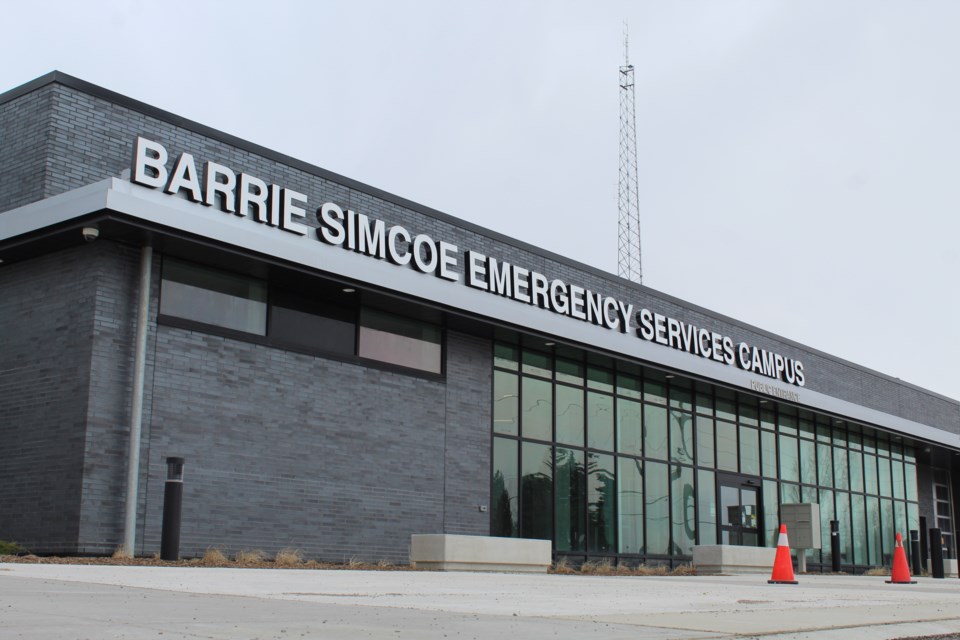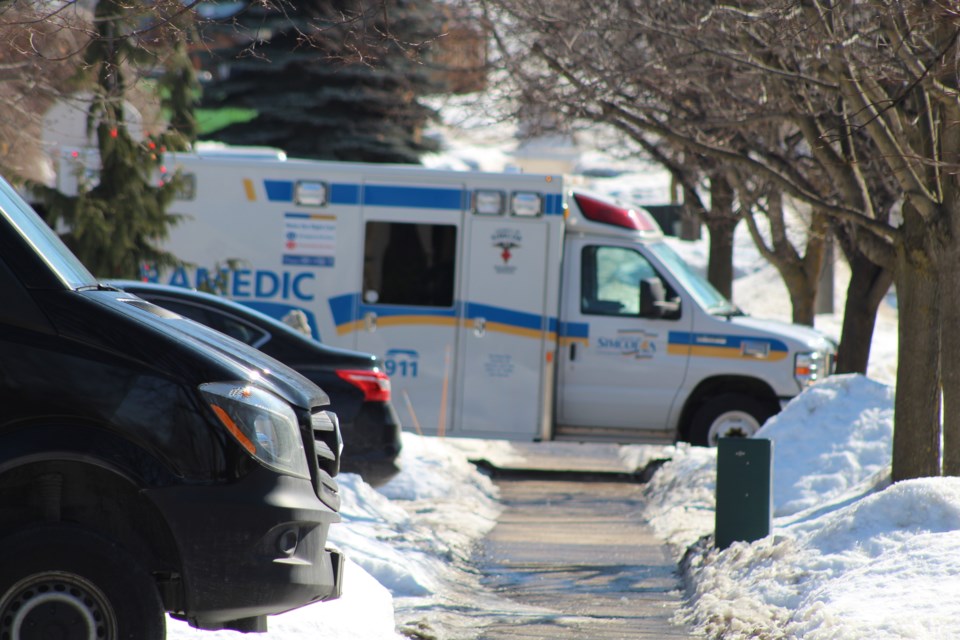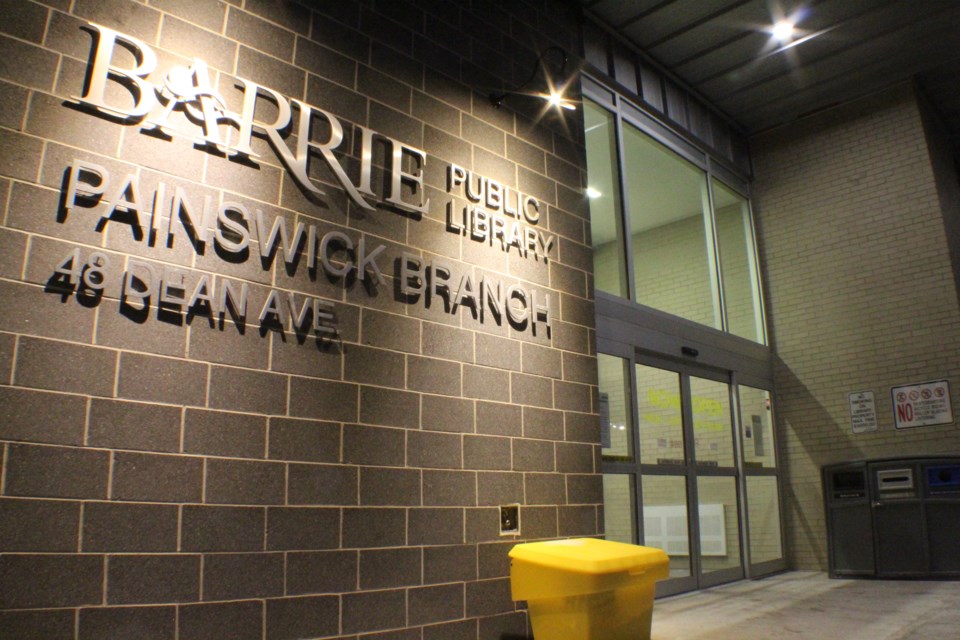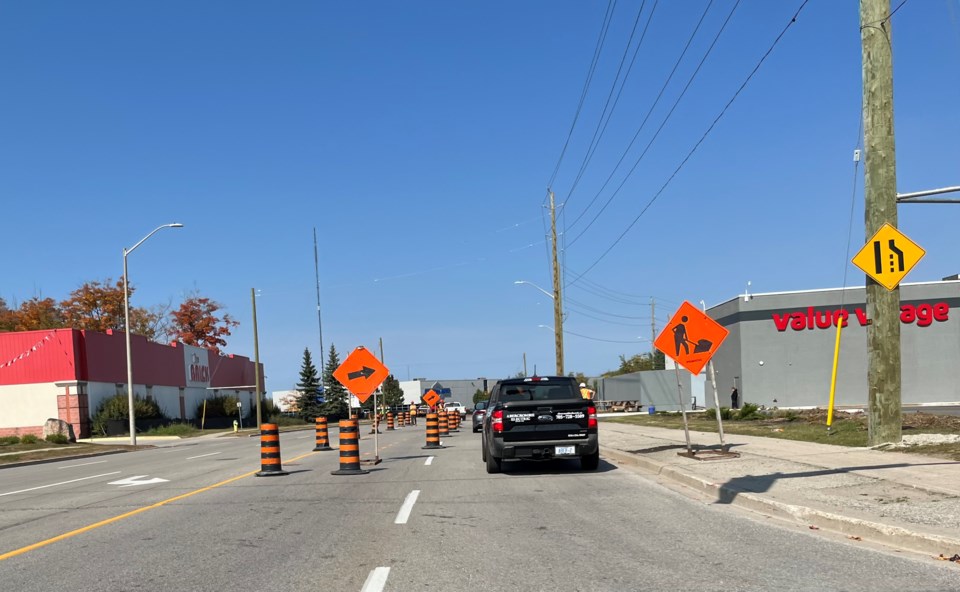Fold away more than a few Canadian bills for this year’s Barrie property tax increase.
City councillors gave initial approval last night to an operating/capital budget which calls for a 4.82 per cent tax increase to homeowners. This equals $228 more in 2024 on a typical city home assessed at $368,000 — which had a 2023 tax bill of $4,724 on a typical home assessed at $365,040.
“Where we thought possible, we have knocked it down,” Mayor Alex Nuttall said of this year’s property tax increase, which still requires final approval by city council on Jan. 31. “There’s going to be more work done over the next week … to try to get the city to a better place on this budget.
“We need to continue to roll our sleeves up, do the hard work to keep it (taxes) down," he added.
On Dec. 6, council approved the city portion of the budget, Barrie’s annual operating and capital spending, with no tax increase. It sets levels for more than 60 services such as firefighting, snow clearing, road repairs, transit, parks and recreation and water treatment.
There’s a two per cent tax-rate increase for infrastructure investment funding or IIF, used to replace and renew Barrie’s roads, pipes, buildings and bridges. It equals another $94.51 on a typical city home assessed at $368,000. Half would go for tax-based infrastructure and the other half for stormwater infrastructure.

Service partners
Councillors also debated the city’s service partners budgets Wednesday — for the Barrie Police Service, the County of Simcoe and Barrie Public Library, along with the local health unit, conservation authorities and physician recruitment — spending that equalled another 2.82 per cent tax hike or $133.56 more, again on that typical Barrie home assessed at $368,000.
Leading service partners’ spending is a $67.5-million police budget, a 6.78 per cent or almost a $4.3-million increase from last year, from $63.24 million.
“This is a large amount of money and we have seen two increases in the last two years that are a hard pill to swallow,” said Deputy Mayor Robert Thomson, who sits with Nuttall on the Barrie Police Services Board. “(City police) are aware of the cost to the municipal taxpayer. Policing is a very expensive service, but a very needed service.”
Police spending is historically the largest portion of Barrie’s annual operating budget. In 2023 it was approximately 22.1 per cent. It was 21.8 per cent in 2022, 22.2 per cent in 2021.
Of the 6.78 per cent budget increase, 5.3 per cent is for salaries and benefits alone.
A new five-year contract, with average annual wage increases of 3.5 per cent, was recently announced between Barrie Police Association and the police board.
The association represents 250 uniform and 125 civilian members of Barrie city police. The previous five-year contract expired on Dec. 31, 2023. The new contract runs from Jan. 1, 2024 until Dec. 31, 2028.
The new deal also includes an increase in wellness supports and provides a small premium paid to front-line officers who work 12-hour rotating shifts. Provisions within the collective agreement will allow Barrie police the ability to explore expanding the use of special constables throughout the community, including downtown Barrie and in neighbourhoods and areas that require specialized community engagement.
Salaries, benefits and overtime are estimated to be 95 per cent of this year’s police budget.
It replace six officers a year during 2024 and 2025, and this year’s police budget includes four new civilian positions — a privacy and access clerk, a digital evidence management administrator, what’s called an organizational wellness administrative assistant and a communicator for next generator 911, which allows for additional details in emergency situations, such as the use of video.
The 2024 police budget also contains money for technology and infrastructure.
This includes software to support body-worn cameras, digital evidence management, closed-circuit television cameras, automated licence-plate recognition, next-generation 911 implementation, as well as information technology infrastructure and security.
There’s also money in the budget for Workplace Safety and Insurance Board (WSIB) mental stress injury claim costs. Police officers will experience 400 to 600 traumatic events throughout their career, according to Barrie police, compared to three to four such events for an average citizen.
The Barrie Police Service's 2023 budget asked for 7.28 per cent more funding, or a $4.29-million increase.
Councillors also passed a motion Wednesday that the Barrie police board work with members of the city’s community safety committee to identify three to five performance goals reflecting key strategic objectives of the city and Barrie police by May. They would provide a status update by October.
Aside from police spending this year among the city’s service partners, there’s $30.5 million for the county, $9.7 million for the Barrie Public Library, $2.2 million for the Simcoe Muskoka District Health Unit, $420,000 for the Nottawasaga Valley Conservation Authority, $370,800 for the Lake Simcoe Region Conservation Authority, and $60,000 for Barrie Area Physician Recruitment.
This means a net tax-levy requirement of $110.9 million in 2024 for the service partners, an increase of $9.1 million compared to 2023’s total of $101.7 million.
“This is a steep increase that’s being requested,” Nuttall said.

The majority of the service partners budget is for police, at 61 per cent, and the County of Simcoe, at 28 per cent. Of the $110.9-million service partners budget, $98.1 million or 89 per cent comes from these two services.
The county provides Barrie with a number of services — land ambulances and paramedics, social housing, long term care homes, Ontario Works, children’s services, homelessness prevention, shelter system co-ordination, affordable housing, health and emergency services, Simcoe County Museum and Simcoe County Archives, which store city records.
Barrie pays its share of these services, $30.5 million this year, the city says, up from $26.2 million in 2023 — a $4.3-million or 16.2 per cent increase, the city says.
For land ambulances and paramedics, as an example, Barrie’s bill would be $8.77 million this year, or $1.3 million more, an increase of 18 per cent. Barrie contributes 25 per cent of the total budget for regional paramedic services.
Simcoe County paramedics have 17 stations and eight posts. This year’s budget adds six front-line paramedics, two platoon supervisors and one project co-ordinator.
The county is also budgeting for a $684,000 increase in Barrie’s Ontario Works bill, to $4.725 million, or 17 per cent more. The projected caseload is 5,702.
Health and emergency services would be 14.3 per cent more expensive for the city this year, rising almost $1.3 million to $10.3 million. This includes four homes and 544 beds in Simcoe County, with 16 additional beds in Georgian Manor in Penetanguishene and 34 more beds at Simcoe Manor in Beeton.
The total budget for social housing for Barrie is $7.8 million. And while 42 per cent of the county’s social housing units are within Barrie, the city contributes 25 per cent of the total county budget for regional social housing.
The county is also continuing to build affordable housing in Barrie this year, with its $217-million affordable housing and community service hub development at the Rose Street property in Barrie. It will create 215 new affordable housing units in the city. Work on this project is anticipated to occur 2024 to 2026-27.
Barrie councillors did approve a motion Wednesday night that city staff review the shared services agreement, to ensure it is aligned with council’s strategic priorities and there’s a value for service audit of the past three years of the county’s financial information, with city funding as much as $50,000 to pay for it, by the end of September, before the shared services agreement is renegotiated.
“It’s up to us to ensure that there’s value for money,” said Coun. Bryn Hamilton. “I think it would be money well spent. Given the amount of money we give to the county (for its services), we need this review.”
“Were talking about a $30-million-a-year set of programs we are funding,” Nuttall said. “It’s good information for our council, good information for our people.”

The Barrie Public Library is asking for another 5.53 per cent in city funding this year, or $517,923 more.
New to the library budget is to be information referral and community navigation, with a $78,387 price tag. It links vulnerable people to the most appropriate services and supports, promotes mental health and well-being during what the Barrie Public Library calls an unprecedented mental health, addictions and food insecurity crises.
The library is looking at contracting out, to another agency, for support in helping people navigate the social services system.
That $78,387 was removed from the Barrie library budget by councillors Wednesday, with the expectation that the county will fund it.
Thomson pointed out the library has $2.7 million in reserves.
“Healthy reserves like that are an over-taxation of our people (Barrie residents),” he said.
The library board is also being requested to work with finance and responsible governance committee members to identify three to five performance goals which reflect key strategic objectives of the city and the library board by May. There would be a status report by October.
The city budgeted almost $1.18 million for security services in 2023, $1.21 million in 2022 and has budgeted $1.23 million for 2024.
The Barrie library is asking that the municipal (city) grant portion of this year’s budget increase to $9,891,033 from $9,373,110 last year.
Inflation is expected to add $180,697 to library expenses this year.
Salaries and benefits this year would total $6.64 million, an increase from $6.38 million last year. This breaks down to a salary increase of $158,247, $99,591 more in benefits, for a $258,839 total. The Barrie Public Library has 95 employees at its three branches.
Not every aspect of library operations and expenses is increasing this year. There would be a reduction of $100,000 in the library materials and programs budget, and this will result in fewer library materials and longer wait times for the most popular items. The library materials and programs budget would fall to $1.3 million this year from $1.4 million from last year.
Partially offsetting those savings is an expected four to eight per cent increase in what library officials call vendor costs — library materials, books, DVDs, etc. The library is also raising the cost of non-Barrie resident membership from to $100 from $75 to reflect inflation and enhanced library services. No provincial funding increase is expected, but the library says advocacy is in progress.
The Barrie Public Library has budgeted for total 2024 expenses of $10.46 million, paid for by the $9.89 million city grant and $569,749 in other grants and fees. Last year’s nearly $9.4 million city grant was augmented by $841,183 in other fees and grants for a $10.2-million budget total.
It has 12,473 new library members since last year, for a total of 41,145, and also had a 52 per cent increase to in-person visits last year, compared to 2022.
Its downtown branch, on Worsley Street, was built in 1996 and is 56,200 square feet, while the Painswick branch on Dean Avenue is 15,000 sq. ft. and was built in 2011. The Holly Community Library opened in mid-2022 at 555 Essa Rd., and is 4,500 sq. ft.
There are plans for more branches in Barrie — in community centres planned in the Hewitt's and Salem areas in the former Innisfil land, each at 15,000 sq. ft. in size.
The total service partner budget shows an increase of nine per cent compared to 2023, equivalent to a 2.85 per cent property tax increase for Barrie residents.
A $3,205,000 increase in city spending equals a one per cent impact on Barrie property taxes this year.
More rising costs
There are other rising costs for city homeowners this year that are part of the budget.
Barrie’s user-rate budget for water requires a 3.97 per cent annual rate increase, or $15.42 more this year for a typical Barrie home. For wastewater (sewer), the rate increase would be 4.94 per cent, or $27.61 more for a typical home.
For a typical household that uses 180 cubic metres of water and wastewater annually, the 2023 cost of water services is $389 and for wastewater services $559. Those annual bills would increase to $404.42 and $586.61 respectively this year.
The 2024 tax-supported base operating budget for city operations and the IIF has gross expenditures of $325.5 million and a net property tax levy requirement of $191.9 million.
Driving this year’s expenses in the city portion of the operating budget is a $9.2 million or 2.88 per cent hike in costs to maintain Barrie’s service levels, although this is partially offset by an anticipated $6-million increase in property tax assessment next year. Other reductions moved it to zero.
The city’s 2024 capital budget totals $691 million — including previously approved funding requests of $269 million, $253 million in spending this year and $169 million in ongoing, multi-year costs.

Key capital projects in 2024 include the construction of Bryne Drive South from Harvie Road to north of Caplan Drive, building the Allandale and downtown transit mobility hubs, constructing Duckworth Street from Bell Farm Road to St.Vincent Street and the new transmission watermain and road expansion on Bayview Drive, from Little Avenue to Big Bay Point Road.
Also in the capital budget is the new waterfront 1,000 tree-planting program, spending $50,000 for 2024 and then $50,000 per year for the next nine years, to be funded from the city’s ecological offsetting reserve.
Capital spending is funded from a combination of property taxes, development charges, issuing debt, grants, user rates and reserves.
Development charges are designed to recover the capital costs associated with residential and non-residential (commercial, industrial, institutional) growth within a municipality from developers, so that existing residents don’t have to foot the bill for new residents.
Property taxes are calculated based on the Municipal Property Assessment Corporation’s (MPAC) assessed value. MPAC last did a province-wide assessment in 2016, so Barrie’s property values are significantly lower than actual 2024 market values.
Municipal governments cannot pass deficit budgets, but they can accumulate debt.
Barrie’s forecast debt level at the end of 2023 is $299 million, drops to $280 million this year, then it’s $294 million in 2025, $291 million in 2026, $287 million in 2027 and $277 million in 2028.
Large 2024 debt items include almost $5.2 million for the city’s fleet renewal and $3.9 million for the waste water treatment facility’s new advanced nutrient renewal system.
Last year’s city operating and capital budgets resulted in a 2.89 per cent property tax hike for Barrie homeowners. On the typical Barrie home assessed at $365,040, that increase equalled $134 more this year — bringing its total taxes from $4,612 in 2022 to $4,746 in 2023.
The Oraclepoll Research phone survey of city residents this past fall gives Barrie councillors some guidance at budget time..
To maintain existing city service levels, respondents were asked if they were willing to pay slightly higher taxes. While 43 per cent said yes, 48 per cent said no and nine per cent were unsure.
Respondents were also asked if the taxes they pay to the City of Barrie are fair in relation to services received. While 44 per cent answered yes, 46 per cent said no and 10 per cent were unsure.
Oraclepoll’s survey of 1,000 adult Barrie residents took place Oct. 18-26, 2023 and the results have a margin of error of plus or minus 3.1 per cent.


